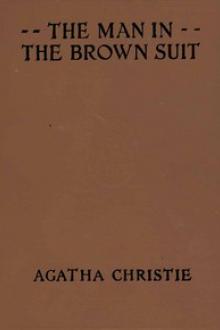The Man in the Brown Suit - Agatha Christie (read dune txt) 📗

- Author: Agatha Christie
- Performer: -
Book online «The Man in the Brown Suit - Agatha Christie (read dune txt) 📗». Author Agatha Christie
At any rate, all these things are very cheering after England. I can’t help thinking that it would brighten our cold Island life if one could have a breakfast of bacon-bacon, and then go out clad in a jumper-jumper to pay the books.
Suzanne was a little tamer after breakfast. They had given me a room next to hers with a lovely view right out over Table Bay. I looked at the view whilst Suzanne hunted for some special face-cream. When she had found it and started an immediate application, she became capable of listening to me.
“Did you see Sir Eustace?” I asked. “He was marching out of the breakfast room as we went in. He’d had some bad fish or something and was just telling the head waiter what he thought about it, and he bounced a peach on the floor to show how hard it was—only it wasn’t quite as hard as he thought and it squashed.”
Suzanne smiled.
“Sir Eustace doesn’t like getting up early any more than I do. But, Anne, did you see Mr. Pagett? I ran against him in the passage. He’s got a black eye. What can he have been doing?”
“Only trying to push me overboard,” I replied nonchalantly.
It was a distinct score for me. Suzanne left her face half anointed and pressed for details. I gave them to her.
“It all gets more and more mysterious,” she cried. “I thought I was going to have the soft job sticking to Sir Eustace, and that you would have all the fun with the Rev. Edward Chichester, but now I’m not so sure. I hope Pagett won’t push me off the train some dark night.”
“I think you’re still above suspicion, Suzanne. But, if the worst happens, I’ll wire to Clarence.”
“That reminds me—give me a cable form. Let me see now, what shall I say. ‘Implicated in the most thrilling mystery please send me a thousand pounds at once Suzanne.’”
I took the form from her, and pointed out that she could eliminate a “the,” an “a,” and possibly, if she didn’t care about being polite, a “please.” Suzanne, however, appears to be perfectly reckless in money matters. Instead of attending to my economical suggestions, she added three words more: “enjoying myself hugely.”
Suzanne was engaged to lunch with friends of hers, who came to the hotel about eleven o’clock to fetch her. I was left to my own devices. I went down through the grounds of the hotel, crossed the tram-lines and followed a cool shady avenue right down till I came to the main street. I strolled about, seeing the sights, enjoying the sunlight and the black-faced sellers of flowers and fruits. I also discovered a place where they had the most delicious ice-cream sodas. Finally, I bought a sixpenny basket of peaches and retraced my steps to the hotel.
To my surprise and pleasure I found a note awaiting me. It was from the curator of the Museum. He had read of my arrival on the Kilmorden, in which I was described as the daughter of the late Professor Beddingfeld. He had known my father slightly and had had a great admiration for him. He went on to say that his wife would be delighted if I would come out and have tea with them that afternoon at their Villa at Muizenberg. He gave me instructions for getting there.
It was pleasant to think that poor Papa was still remembered and highly thought of. I foresaw that I would have to be personally escorted round the Museum before I left Cape Town, but I risked that. To most people it would have been a treat—but one can have too much of a good thing if one is brought up on it, morning, noon and night.
I put on my best hat (one of Suzanne’s cast-offs) and my least crumpled white linen and started off after lunch. I caught a fast train to Muizenberg and got there in about half an hour. It was a nice trip. We wound slowly round the base of Table Mountain, and some of the flowers were lovely. My geography being weak, I had never fully realized that Cape Town is on a peninsula, consequently I was rather surprised on getting out of the train to find myself facing the sea once more. There was some perfectly entrancing bathing going on. The people had short curved boards and came floating in on the waves. It was far too early to go to tea. I made for the bathing pavilion, and when they said would I have a surf board, I said “Yes, please.” Surfing looks perfectly easy. It isn’t. I say no more. I got very angry and fairly hurled my plank from me. Nevertheless, I determined to return on the first possible opportunity and have another go. I would not be beaten. Quite by mistake I then got a good run on my board, and came out delirious with happiness. Surfing is like that. You are either vigorously cursing or else you are idiotically pleased with yourself.
I found the Villa Medgee after some little difficulty. It was right up on the side of the mountain, isolated from the other cottages and villas. I rang the bell, and a smiling Kafir boy answered it.
“Mrs. Raffini?” I inquired.
He ushered me in, preceded me down the passage and flung open a door. Just as I was about to pass in, I hesitated. I felt a sudden misgiving. I stepped over the threshold and the door swung sharply to behind me.
A man rose from his seat behind a table and came forward with outstretched hand.
“So glad we have persuaded you to visit us, Miss Beddingfeld,” he said.
He was a tall man, obviously a Dutchman, with a flaming orange beard. He did not look in the least like the curator of a museum. In fact, I realized in a flash that I had made a fool of myself.
I was in the hands of the enemy.
CHAPTER XIXIt reminded me forcibly of Episode III in “The Perils of Pamela.” How often had I not sat in the sixpenny seats, eating a twopenny bar of milk chocolate, and yearning for similar things to happen to me. Well, they had happened with a vengeance. And somehow it was not nearly so amusing as I had imagined. It’s all very well on the screen—you have the comfortable knowledge that there’s bound to be an Episode IV. But in real life there was absolutely no guarantee that Anna the Adventuress might not terminate abruptly at the end of any Episode.
Yes, I was in a tight place. All the things that Rayburn had said that morning came back to me with unpleasant distinctness. Tell the truth, he had said. Well, I could always do that, but was it going to help me? To begin with, would my story be believed? Would they consider it likely or possible that I had started off on this mad escapade simply on the strength of a scrap of paper smelling of moth balls? It sounded to me a wildly incredible tale. In that moment of cold sanity I cursed myself for a melodramatic idiot, and yearned for the peaceful boredom of Little Hampsly.
All this passed through my mind in less time than it takes to tell. My first instinctive movement was to step backwards and feel for the handle of the door. My captor merely grinned.
“Here you are and here you stay,” he remarked facetiously.
I did my best to put a bold face upon the matter.
“I was invited to come here by the curator of the Cape Town Museum. If I have made a mistake——”
“A mistake? Oh, yes, a big mistake!”
He laughed coarsely.
“What right have you to detain me? I shall inform the police——”
“Yap, yap, yap—like a little toy dog.” He laughed.
I sat down on a chair.
“I can only conclude that you are a dangerous lunatic,” I said coldly.
“Indeed?”
“I should like to point out to you that my friends are perfectly well aware where I have gone, and that if I have not returned by this evening, they will come in search of me. You understand?”
“So your friends know where you are, do they? Which of them?”
Thus challenged, I did a lightning calculation of chances. Should I mention Sir Eustace? He was a well-known man, and his name might carry weight. But if they were in touch with Pagett, they might know I was lying. Better not risk Sir Eustace.
“Mrs. Blair, for one,” I said lightly. “A friend of mine with whom I am staying.”
“I think not,” said my captor, slyly shaking his orange head. “You have not seen her since eleven this morning. And you received our note, bidding you come here, at lunch-time.”
His words showed me how closely my movements had been followed, but I was not going to give in without a fight.
“You are very clever,” I said. “Perhaps you have heard of that useful invention, the telephone? Mrs. Blair called me up on it when I was resting in my room after lunch. I told her then where I was going this afternoon.”
To my great satisfaction, I saw a shade of uneasiness pass over his face. Clearly he had overlooked the possibility that Suzanne might have telephoned to me. I wished she really had done so!
“Enough of this,” he said harshly, rising.
“What are you going to do with me?” I asked, still endeavouring to appear composed.
“Put you where you can do no harm in case your friends come after you.”
For a moment my blood ran cold, but his next words reassured me.
“To-morrow you’ll have some questions to answer, and after you’ve answered them we shall know what to do with you. And I can tell you, young lady, we’ve more ways than one of making obstinate little fools talk.”
It was not cheering, but it was at least a respite. I had until to-morrow. This man was clearly an underling obeying the orders of a superior. Could that superior by any chance be Pagett?
He called and two Kafirs appeared. I was taken upstairs. Despite my struggles, I was gagged and then bound hand and foot. The room into which they had taken me was a kind of attic right under the roof. It was dusty and showed little signs of having been occupied. The Dutchman made a mock bow and withdrew, closing the door behind him.
I was quite helpless. Turn and twist as I would, I could not loosen my hands in the slightest degree, and the gag prevented me from crying out. If, by any possible chance, any one did come to the house, I could do nothing to attract their attention. Down below I heard the sound of a door shutting. Evidently the Dutchman was going out.
It was maddening not to be able to do anything. I





Comments (0)